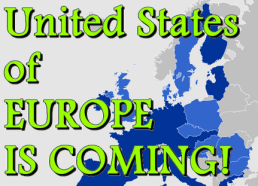Some leaders wish to complete integration and form a European superstate but citizens consistently reject the opportunity when given a say. In practice the same leaders retreat under pressures of the moment.
Robert Frost makes our point pithily:

In our previous post [1], to which this is a follow-up, Guy Verhofstadt confirms that he is at the sharp end of those who are in favour of completing the project plan to achieve a federal government for at least part of Europe. Our commentary did little more than re-state this objective more clearly and point out a few of its weaknesses. We now look at some other weaknesses of the EU Project and ask whether the whole thing should be closed down in favour of a more practical and less obtrusive approach to European collaboration.
Verhofstadt points out where the EU lacks strength as it is at present—in an intermediate stage, as he sees it, on the way to completing ever closer union, with a federal government having legal authority over whatever may be left of nation states. Here are some of the points he makes, with which we agree but suggest that they point to the opposite of what he proposes:
“…the European Union can be pretty powerless”, “Covid-19 has exposed Europe’s lack of thrust…” and “… the 27 health ministers…mainly fail to streamline their actions.”
 We accept that the EU has many weaknesses but argue that these derive from its underlying ideology and consequent design, and not from the reluctance of member states to accept full federation, though that may be explained by the redundant ideology. We believe that while leaders of some member states may sign up willingly to be part of a federation (Macron for example), their citizens would not be so keen. Citizens make it clear, whenever they are given a voice, that they value the opportunity to dismiss a government that has failed them, as they see it. The EU is designed to avoid that outcome, which would not be consistent with the ideology [2].
We accept that the EU has many weaknesses but argue that these derive from its underlying ideology and consequent design, and not from the reluctance of member states to accept full federation, though that may be explained by the redundant ideology. We believe that while leaders of some member states may sign up willingly to be part of a federation (Macron for example), their citizens would not be so keen. Citizens make it clear, whenever they are given a voice, that they value the opportunity to dismiss a government that has failed them, as they see it. The EU is designed to avoid that outcome, which would not be consistent with the ideology [2].
The EU is “pretty powerless” to achieve its stated goals of security and prosperity for all its citizens [3], among others. But this is because its design cannot achieve such an outcome, for at least two reasons: first, it is not governments—national or federal—that create prosperity but citizens and the companies they work for who do that; and second, imposing autocracy, oligarchy, or whatever, does not deliver security because, as history has shown repeatedly, people will resist a superior authority and, eventually, remove it [4].
The correct solution may be to dissolve the EU and build something more useful and pragmatic, perhaps on the lines that Europeans began earlier (for example, the Council of Europe) but found themselves outrun by a flashy alternative that has been imposed top-down and is now showing clearly that it cannot be made to work, though it can be made to survive, at a cost to its citizens.
Among the ‘fundamental’ principles of the EU is the free movement of goods and people. As we write, this principle has been shredded by member states, many of which have imposed border restrictions that have upset such movements. A federal government could, of course, overrule such restrictions in the name of freedom of movement but what would be the consequences in the face of a pandemic? It may be hard to imagine how ‘soft’ cooperation or alternative collaboration could do better, but until they are tried they could hardly do worse than the present confusion [5].
 The present EU-imbecility and its corresponding weakness is well illustrated by the recent comment of Mario Centeno, the President of the Eurogroup, “We will do whatever it takes and more to restore confidence and support a recovery”. Apart of the silliness of “and more”, the benefits of the €750billion of bonds that the European Central Bank (ECB) has promised will go mostly to banks. The President of the ECB, Christine Lagarde, has said that there “are no limits to our commitment to the euro”, though she added the weasely, “within its mandate”, thus making a lie of “whatever it takes”. This is the reality of federal authority, its priorities are not those of its citizens [6].
The present EU-imbecility and its corresponding weakness is well illustrated by the recent comment of Mario Centeno, the President of the Eurogroup, “We will do whatever it takes and more to restore confidence and support a recovery”. Apart of the silliness of “and more”, the benefits of the €750billion of bonds that the European Central Bank (ECB) has promised will go mostly to banks. The President of the ECB, Christine Lagarde, has said that there “are no limits to our commitment to the euro”, though she added the weasely, “within its mandate”, thus making a lie of “whatever it takes”. This is the reality of federal authority, its priorities are not those of its citizens [6].
We started our previous post with this: “Some see the covid-19 pandemic as an opportunity and a requirement to hasten and tighten the programme of unification; others see it as the likely end of a failed experiment.” There are still others in between these two extremes, supporting the project but not the grand design or the ideology.
 Jan Techau, a senior fellow and director of the Europe Program at the German Marshall Fund of the United States, argues that pushing for a federal republic puts the EU project at risk. He has an article in EUObserver [7] (18/03/2020) titled, Taking the aether out of the EU universe. Some people, such as Guy Verhofstadt, “…believe that it is clearly obvious to everyone…that the nation state is over and that “more Europe” is actually a viable political program across the board, not just a slogan.”
Jan Techau, a senior fellow and director of the Europe Program at the German Marshall Fund of the United States, argues that pushing for a federal republic puts the EU project at risk. He has an article in EUObserver [7] (18/03/2020) titled, Taking the aether out of the EU universe. Some people, such as Guy Verhofstadt, “…believe that it is clearly obvious to everyone…that the nation state is over and that “more Europe” is actually a viable political program across the board, not just a slogan.”
Techau doesn’t agree, because a “European republic won’t be installed any time soon (or ever), but it is clear that political participation by citizens needs to be improved within the EU, an already deeply integrated political entity.” Part of the “problem is that in the absence of any recognisable political will among European voters and leaders to create any of these outcomes for the EU, the stubborn insistence that it all must and will happen looks increasingly out of place.”
For us the problem is not that it looks “out of place” but that it is ill-founded, except in the eyes and minds of those who drive it. Techau describes himself as a “hard-nosed Euro-realist” who is “deeply in love with the historic greatness of the integration project, but who favour incremental progress and a carefully balanced approach to” more Europe (he uses the same misleading trope as Verhofstadt and so many others in and around the EU).
He agrees (with us) that “Europe is indeed in dire need of much more intensive cooperation and also integration on many fronts…” and that there “is no surer way to turn people against the great idea of European integration than to keep promising them huge progress against all probability and plausibility.”
However, Techau is arguing at the level of Intra-EU discussion and does not address the fundamental issues of ideology and design: “This tendency to permanently root the Europe debate in the realm of the un-doable produces the opposite of what it desires to bring about.” With the result that citizens “instinctively feel that the pro-Europe case is uncoupled from political realities.” He warns “that unfounded theory and overplayed optimism are ill-equipped to deliver results in the current political environment…” and “are seen as betrayal” by ‘dreamers’ such as Verhofstadt, who instead “of looking like the vanguard of progress…look like hopeless dreamers whose main function is to soothe the guilty conscience of leaders who don’t want to disappoint them but can’t tell them the truth either.” [8]
 We counter that no amount of superficial re-arrangement or incremental adjustment will stop either the dreamers pushing for quick completion of union, as they see it (uniformity as we see it) or the discouragement and disaffection of citizens, who say they do not want to live under a federal government—at least whenever they are asked, which is rarely, and never by the EU which disdains their opinions [9].
We counter that no amount of superficial re-arrangement or incremental adjustment will stop either the dreamers pushing for quick completion of union, as they see it (uniformity as we see it) or the discouragement and disaffection of citizens, who say they do not want to live under a federal government—at least whenever they are asked, which is rarely, and never by the EU which disdains their opinions [9].
[1] Those in Favour
[2] So What is Democracy? and https://eurout.net/wp-content/uploads/2019/06/eu-on-democracy.pdf
[3] For example, the Treaty on the Functioning of the European Union has Article 198:
“In accordance with the principles set out in the preamble to this Treaty, association shall serve primarily to further the interests and prosperity of the inhabitants of these countries and territories in order to lead them to the economic, social and cultural development to which they aspire.”
[4] Democracy Denied
[5] https://euobserver.com/coronavirus/147788
[6] The Death of the Euro and Themes-8: Economics-2
[7] https://euobserver.com/opinion/147782
[8] It’s a Rip Off and The Jewel in Whose Crown?
[9] Themes-11: Disdain & Contempt
The possible new world after the Covid-19 coronavirus.
2 paradigms:
– Darwinism: The Law of the Strongest
– Communism: united people, will never be defeated
1 syndrome:
– How the orangutan maintains its leadership
The third way:
– God and gods
LikeLike
Sorry Antonio but I don’t understand the point you are making. I’m glad you are still following our blog but can you clarify for me? Thanks.
LikeLike